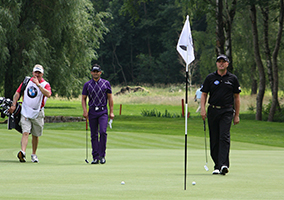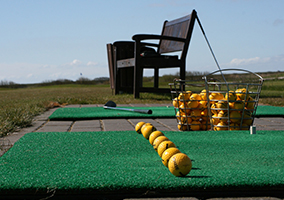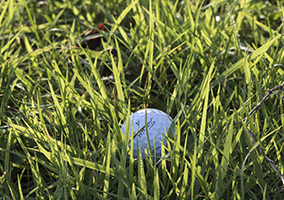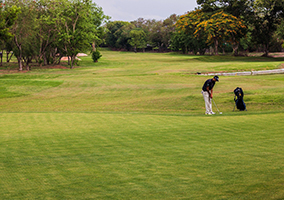I have learned through the years my sales results are often like my golf game
I can remember my first golf lesson when I was in 8th grade… I had offered to be a caddy for my mother while she tried to play 18 holes on a new golf course in the hills of Northwest Arkansas. I elected to swing at a few balls myself that afternoon. I was discouraged on the first hole I attempted as the balls either shanked right or were driven into the creek that lined the fairway (I teed off six times). While it was not a formal lesson, I began to learn something about the sport – it is not easy, and practice is essential for a winning game.
At the ripe age of 17, I took my first formal golf instruction. We worked on mechanics such as keeping an eye on the ball, the back swing, the transition, the downswing, and the follow through along with a futile attempt to help my mental game. My instructor often scoffed at me as I did not seem to care too much about the mechanics or the mental game, I just wanted to play. Later I was given an ultimatum, “I have students that want to learn this game, if you don’t take this seriously, I will not coach you anymore”. That tough love steered my golf game (and my life) in a new direction. I entered the profession of sales at the age of 21. It was not long thereafter when I could see what I learned in my golf lessons was applicable to my sales results.
-

Sales jitters are normal and should be anticipated – Most of us have jitters when we step up to the tee for the first time. Embrace it! That is your body responding to the situation. When we embrace our jitters, with practice we can learn to control them and even utilize them to drive our performance. Jitters are part of the game of golf, and in life. There are long term dividends for those who learn how to bridal and optimize their jitters.
 Visualization is a valuable tool – Many times while playing golf, one of my golf buddies would say, “visualize where you want the ball to go”. And sure enough, my game improved when I focused on the outcome. It is sound advice both in golf and in sales. This same encouragement has been provided to me from sales manager and other sales associates. I know when I plan and visualize the desired outcomes for a meeting, I often walk out of the meeting feeling like the meeting was successful. It may not always be as I visualized, but I feel it leads to improved results.
Visualization is a valuable tool – Many times while playing golf, one of my golf buddies would say, “visualize where you want the ball to go”. And sure enough, my game improved when I focused on the outcome. It is sound advice both in golf and in sales. This same encouragement has been provided to me from sales manager and other sales associates. I know when I plan and visualize the desired outcomes for a meeting, I often walk out of the meeting feeling like the meeting was successful. It may not always be as I visualized, but I feel it leads to improved results.
 Sales is a team sport – I am not talking about joint sales calls (or am I?). Golf is a competitive sport, just as sales opportunities can be competitive. I have learned there is a certain level of trust developed in the game of golf. Trusting your golf partners, trusting your caddy, trusting in your own abilities. When we build trust with the customer, we begin to erode the position of the competition. Yeah, it is a joint sales call as the customer is on my team. How powerful is that when our customer is selling our solution to his organization because of the trust that has been created!
Sales is a team sport – I am not talking about joint sales calls (or am I?). Golf is a competitive sport, just as sales opportunities can be competitive. I have learned there is a certain level of trust developed in the game of golf. Trusting your golf partners, trusting your caddy, trusting in your own abilities. When we build trust with the customer, we begin to erode the position of the competition. Yeah, it is a joint sales call as the customer is on my team. How powerful is that when our customer is selling our solution to his organization because of the trust that has been created!
 Humility is a worthy trait – I have always been amazed at how the best golfers are so humble. I believe it is because they know and respect their competition. They know they are one swing away from having a successful or not so successful round of golf. As salespeople, we too should be humble. Humility creates opportunities to understand what drives our customer’s decisions. From a place of humility, we can begin to learn and to improve our position. Just like in golf, a professional should exude confidence and competency, but add in humility and it is a recipe for success.
Humility is a worthy trait – I have always been amazed at how the best golfers are so humble. I believe it is because they know and respect their competition. They know they are one swing away from having a successful or not so successful round of golf. As salespeople, we too should be humble. Humility creates opportunities to understand what drives our customer’s decisions. From a place of humility, we can begin to learn and to improve our position. Just like in golf, a professional should exude confidence and competency, but add in humility and it is a recipe for success.
 Luck happens, but hard work is always the better path – l have felt luck plays only a small role in my golf game. My raw talent only gets me so far on the golf course. Arnold Palmer divulged his luck increased tenfold when he worked hard. The more you practice, the “luckier” you are likely to get. Why do they have a practice green on the golf course? When I practice and do the hard work regularly, both my golf game and my sales results improve significantly.
Luck happens, but hard work is always the better path – l have felt luck plays only a small role in my golf game. My raw talent only gets me so far on the golf course. Arnold Palmer divulged his luck increased tenfold when he worked hard. The more you practice, the “luckier” you are likely to get. Why do they have a practice green on the golf course? When I practice and do the hard work regularly, both my golf game and my sales results improve significantly.
 Never say never – Whether it is learning the game of golf or seeking to improve ourselves by going back to school to earn a degree, the smallest obstacle or the littlest failure can stop us in our tracks. Unless it is an old undesirable habit, giving up is easy. Too easy. With hard work, even an inexperienced golfer can make great strides and accomplish great things. Golf teaches athletes not to give up, even in the face of repeated failures. Life is a lot like this with the adage “what doesn’t kill you makes you stronger”.
Never say never – Whether it is learning the game of golf or seeking to improve ourselves by going back to school to earn a degree, the smallest obstacle or the littlest failure can stop us in our tracks. Unless it is an old undesirable habit, giving up is easy. Too easy. With hard work, even an inexperienced golfer can make great strides and accomplish great things. Golf teaches athletes not to give up, even in the face of repeated failures. Life is a lot like this with the adage “what doesn’t kill you makes you stronger”.
 Do not dwell on your mistakes or failures – How many times have I beaten myself up over a bad shot or the loss of a sale? I have learned when I spend too much time worrying about my bad shot or the loss of a sale, I find it impacts the next golf swing or sales effort. My past failure is now impacting my present opportunity. Then I learned to see it differently; each shot is a different story — and a chance for redemption. This concept is incredibly valuable in daily life, especially in academia and the work world. Everybody comes up short sometimes, but no matter how bad we mess up, there is always an opportunity to turn it around.
Do not dwell on your mistakes or failures – How many times have I beaten myself up over a bad shot or the loss of a sale? I have learned when I spend too much time worrying about my bad shot or the loss of a sale, I find it impacts the next golf swing or sales effort. My past failure is now impacting my present opportunity. Then I learned to see it differently; each shot is a different story — and a chance for redemption. This concept is incredibly valuable in daily life, especially in academia and the work world. Everybody comes up short sometimes, but no matter how bad we mess up, there is always an opportunity to turn it around.
 Make lemonade with the lemons you have (or go find more lemons) – The circumstances in golf are rarely ideal. I have taken shots from the worst imaginable locations. Complaining does not help my cause. I have learned that a good golfer accepts the situation, strategizes, and remedies it the best they can, while abiding by the rules of the game. Ben Hogan had a great quote: “The most important shot in golf is the next one”. This acceptance of your circumstances and recalculating can pay dividends.
Make lemonade with the lemons you have (or go find more lemons) – The circumstances in golf are rarely ideal. I have taken shots from the worst imaginable locations. Complaining does not help my cause. I have learned that a good golfer accepts the situation, strategizes, and remedies it the best they can, while abiding by the rules of the game. Ben Hogan had a great quote: “The most important shot in golf is the next one”. This acceptance of your circumstances and recalculating can pay dividends.
 Silence is golden – In many sport settings, the atmosphere can be raucous, but not in golf. There is nothing wrong with a raucous atmosphere, but do not underestimate the value of silence. The golfer desires the peace and quiet allowing them to focus on their technique. There is beauty in this silence as it can be a place of growth. When in a sales call, it is not necessary to fill the room with your voice. Ask a question, and then go silent. Let the customer reply. Listen, and then take a moment to focus on your technique before you reply.
Silence is golden – In many sport settings, the atmosphere can be raucous, but not in golf. There is nothing wrong with a raucous atmosphere, but do not underestimate the value of silence. The golfer desires the peace and quiet allowing them to focus on their technique. There is beauty in this silence as it can be a place of growth. When in a sales call, it is not necessary to fill the room with your voice. Ask a question, and then go silent. Let the customer reply. Listen, and then take a moment to focus on your technique before you reply.
 Do not lose sight of the big picture – Golf is a series of swings, but each swing aims for one specific goal. Golfers need to know where they are going and how they plan to get there. If the goal is to build trust with a customer, one or more of your swings should be doing things to build trust. If the goal is to close a sale, then take the time before you take the stroke to plan and prepare properly. Golfers lean on their ability to select the right club based on the lay of the ball. They gauge their circumstances (i.e., distance, slope, wind speed, green speed, etc.) to ensure they have a high percentage of the ball dropping in the hole. They also know part of their planning is ruminating on their follow through. I am not sure who was the author of this quote, but it sums it up, “in golf as in life it is the follow through that makes the difference”. Following through is important on every shot. Whether it is a large or small opportunity to serve the customer, follow through is required to ensure we can remain in the game. Afterall, the big picture is not winning a hole, but winning the game.
Do not lose sight of the big picture – Golf is a series of swings, but each swing aims for one specific goal. Golfers need to know where they are going and how they plan to get there. If the goal is to build trust with a customer, one or more of your swings should be doing things to build trust. If the goal is to close a sale, then take the time before you take the stroke to plan and prepare properly. Golfers lean on their ability to select the right club based on the lay of the ball. They gauge their circumstances (i.e., distance, slope, wind speed, green speed, etc.) to ensure they have a high percentage of the ball dropping in the hole. They also know part of their planning is ruminating on their follow through. I am not sure who was the author of this quote, but it sums it up, “in golf as in life it is the follow through that makes the difference”. Following through is important on every shot. Whether it is a large or small opportunity to serve the customer, follow through is required to ensure we can remain in the game. Afterall, the big picture is not winning a hole, but winning the game.
ARE YOU READY TO FOLLOW THROUGH?

